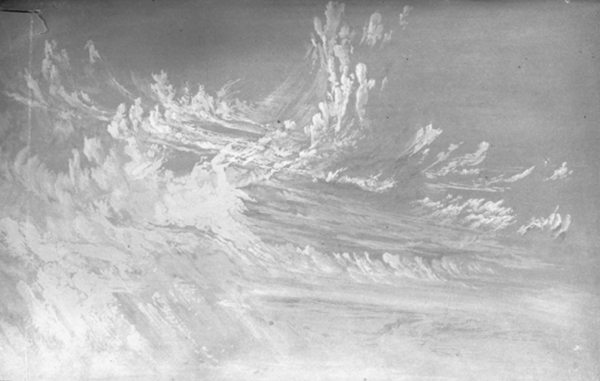7
7
罗斯金不仅鼓励我们在旅行的时候作画,同时他觉得我们应该写,他觉得,写作就是用文字画画,这样做可以巩固我们对于美的印象。在他的一生中,他的绘画非常受人尊敬,但是他的语言描画具有更重要的意义,它吸引了公众的想象力,并且在维多利亚时代晚期给他带来了显赫的名声。
Ruskin did not only encourage us to draw on our travels, he also felt we should write, or as he called it 'word paint', so as to cement our impressions of beauty. However respected he was in his lifetime for his drawings, it was his word-paintings that captured the public imagination and were responsible for his fame in the late Victorian period.
令人陶醉的景致通常让我们意识到语言的贫乏。在湖区给一个朋友的明信片上,我带着某种绝望,匆忙写道,这里景色很美,天气潮湿、多风。罗斯金会将这样的语句更多地归因于懒惰,而不是缺乏能力。他认为,我们有能力进行大量丰富的语言描绘。导致失败的结果仅仅是因为我们没有问自己足够多的问题,没有精确地分析我们的所见和所感。我们不应当仅仅停留在“这片湖很美”的感觉上,我们应该更加积极地问自己,“这片开阔的水面究竟有什么地方如此吸引人?它会让人联想到什么?除了用‘大’这个词之外有什么更好的词可以形容?”以语言描画完成的作品不一定才华横溢,但至少它是一种探寻真实经验的结晶。
Attractive places typically render us aware of our inadequacies with language. In the Lake District, while writing a postcard to a friend, I explained-in some despair and haste-that the scenery was pretty and the weather wet and windy. Ruskin would have ascribed such prose more to laziness than incapacity. We were all, he argued, able to turn out adequate word-paintings. A failure was only the result of not asking ourselves enough questions, of not being more precise in analysing what we had seen and felt. Rather than rest with the idea that a lake was pretty, we were to ask ourselves more vigorously, 'What in particular is attractive about this stretch of water? What are its associations? What is a better word for it than big?' The finished product might not then be marked by genius, but at least it would have been motivated by a search for an authentic representation of an experience.
贯穿整个成年时代,罗斯金都对礼貌的、受过教育的英国人拒绝更有深度地谈论天气而感到沮丧,他们加诸天气的形容词总是“潮湿、风大”,这尤其让罗斯金感觉不适:“人们对天气知之太少,这真是一件怪事。我们从来不关注它,我们从来不把它当作思考的主题,我们只把它看作是一系列无意义和单调的事情,太普通,太无聊,以至于不值得花费一点时间留心或是以欣赏的眼光瞄上一眼。如果在百无聊赖之下,我们最后转向天空,可以说些什么呢?有人说潮湿,有人说风大,还有一种可能说挺暖和。在整个喋喋不休的人群中,谁能告诉我,在今天中午,环绕着地平线的一大片绵延的白色高山,究竟是何种形状,那峭壁又有何种姿态?谁看见从南面照射过来的狭长光束照耀着山顶直至白雪融化、崩流而下形成像蓝色的雨滴?谁看见当昨晚阳光不再照耀,被西风吹得犹如凋零的树叶般的朵朵乌云在空中的舞蹈?”
Ruskin was throughout his adult life frustrated by the refusal of polite, educated English people to talk in sufficient depth about the weather: 'It is a strange thing how little people know about the sky. We never attend to it, we never make it a subject of thought, we look upon it only as a succession of meaningless and monotonous accidents, too common and too vain to be worthy of a moment of watchfulness or a glance of admiration. If in our moments of utter idleness and insipidity, we turn to the sky as a last resource, which of its phenomena do we speak of? One says it has been wet, and another, it has been windy, and another, it has been warm. Who, among the whole chattering crowd, can tell me of the forms and the precipices of the chain of tall white mountains that girded the horizon at noon today? Who saw the narrow sunbeam that came out of the south, and smote upon their summits until they melted and mouldered away in a dust of blue rain? Who saw the dance of the dead clouds when the sunlight left them last night, and the west wind blew them before it like withered leaves?'
当然,答案就蕴涵在另一个有关艺术的功能和吃、喝的功能之间的类推中,罗斯金曾得意地说,他将天空装进了瓶子里,就像他的酒商父亲将雪利酒装进瓶子里一样小心翼翼。这里有两篇日记,记载了在1857年秋天,在伦敦,罗斯金将天空装进瓶子里的两天:
The answer was, of course, Ruskin himself, who liked to boast, in another analogy between the function of art and that of eating and drinking, that he bottled skies as carefully as his sherry-importing father bottled sherries. Here are two diary entries of sky-bottling days in London in the autumn of 1857:
11月1日一个红晕中的早晨,翻腾的云呈现出柔软的红色,云边的红更加鲜艳,接着渐渐变成紫色。灰色的云朵由西南飘来,从其下方向它们靠近,地平线上,飞云和卷云之间则是灰色的积云。多美的一天……远处所有的紫色和蓝色、树丛中迷蒙的阳光、绿色的田野……小心观察那精美的景致,蓝色的天空中散漫了金色的叶子,栗子树纤细而矮小,星星将黑暗衬出。
November 1st : A vermilion morning, all waves of soft scarlet, sharp at the edge, and gradated to purple. Grey scud moving slowly beneath it from the south-west, heaps of grey cumuli-between the scud and cirrus-at horizon. It issued in an exquisite day … All purple and blue in distance, and misty sunshine near on the trees, and green fields … Note the exquisite effect of the golden leaves scattered on the blue sky, and the horse-chestnut, thin and small, dark against them in stars.

阿米蒂奇仿透纳画作镌刻的《云》,出自罗斯金《现代画家》第五卷,1860年
11月3日黎明,紫色、泛红、优美。6点的时候,出现一道灰灰、浓浓的云。接着,被照亮的紫色云朵穿过这堆灰色,露出了上方暗黄色的天空。所有的灰云,和更暗的飞云从西南方斜斜地飘过天空,飘移得很快,然而却并不会让人感到紧张,最后它们渐渐散去。灰色的天空中出现一道黄铜色的光线,光线不久便消逝,灰色的早晨凸现在眼前。
November 3rd : Dawn purple, flushed, delicate. Bank of grey cloud, heavy at six. Then the lighted purple cloud showing through it, open sky of dull yellow above-all grey, and darker scud going across it obliquely, from the south-west-moving fast, yet never stirring from its place, at last melting away. It expands into a sky of brassy flaked light on grey-passes away into grey morning.







